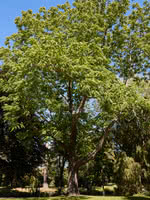Mon-Fri 9am - 5pm Mountain time
Black Walnut vs Mountain Maple
Juglans nigra
Acer spicatum
NOT AVAILABLE THIS SEASON - MIGHT RETURN
CUSTOM GROW
The Black Walnut is a slow growing, large, straight-stemmed tree with an open crown. It produces dense, very hard, edible nuts.
Black Walnut has a deeply-furrowed, black bark. Its leaves are about 1 foot long, composed of 15 - 23 slightly stalked leaflets on a moderately stout stock which provide good dappled shade.
Despite being highly valued for its edible nuts and its shade tree aesthetics, it is rare to see this tree on the prairies.
Note: Black Walnut's roots produce a substance named juglone that is toxic to some other plants. Consider this when choosing where you plant a black walnut, as you will not be able to grow tomato, potato, cabbage, eggplant, blueberry, azalea, rhododendron, lilac, red pine and apple in the surrounding area.
Note: Plant this tree once. It will not respond well to transplanting.
Note: Although self-pollinating, planting two trees significantly improves nut production.
A top CO2 absorbing species. Experts think this tree may help climate change more than others.
Used to growing in the shadows of the damp forest, White Maple (aka Mountain Maple) is a great fit for shady and wet areas, such as beneath larger trees. Unlike most of its cousins, the White Maple is a shrub instead of a tree. It's still a maple, however, with sap that can be made into Maple syrup to prove it!
In May and June, the classic shapes of Maple leaves are joined by clusters of green and yellow flowers. Soon after, red samaras (aka helicopter seeds or whirligigs) appear. This distinctive appearance makes White Maple an excellent choice for giving urban yards a unique (and patriotic) look.

